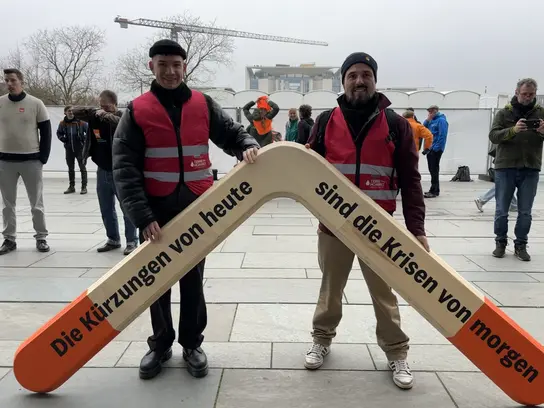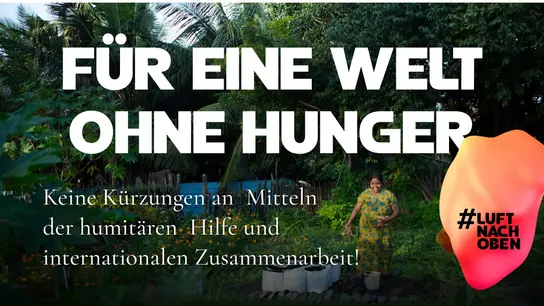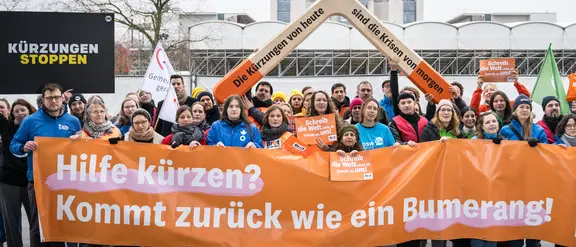More funding for humanitarian aid and development cooperation!
Terre des Hommes and 15 other organizations are calling for a course correction for the 2026 federal budget: They are appealing to the budget committee to increase, rather than cut, funding for humanitarian aid and development cooperation.

Just days before the budget reconciliation meeting for the 2026 federal budget, Terre des Hommes and 15 other civil society organizations are warning of further cuts to development cooperation and humanitarian aid. In an appeal , they are calling for the draft budget to be amended so that Germany can live up to its global responsibilities.
The organizations criticize the planned cuts, arguing that they contradict the goals the German government set for itself in the coalition agreement and with regard to the 2030 Agenda, namely to combat poverty, hunger, and inequality and to strengthen humanitarian aid for people in need. They contend that with these cuts, Germany is sending a signal of retreat and weakening its position as a reliable international partner.
The budget for humanitarian aid at the Federal Foreign Office currently stands at only around one billion euros – a mere 0.2 percent of the federal budget. These funds play virtually no role in budget consolidation efforts. Yet, for countless people worldwide, humanitarian aid from Germany is vital. Furthermore, funding for the Federal Ministry for Economic Cooperation and Development (BMZ) is being cut for the fourth consecutive year. The budget is slated to decrease by a third compared to 2022, to 9.9 billion euros.
Because other major donor countries are also drastically cutting their funding, humanitarian organizations in recipient countries are already having to prioritize severely. According to UN-OCHA, around 300 million people worldwide are dependent on humanitarian aid. However, due to the global cuts, only 114 million people in acute need are expected to receive assistance. If Germany exacerbates this dangerous trend through further cuts, more and more people will be left to fend for themselves in times of crisis. Their rights to food, healthcare, education, and housing will be effectively denied to them.

Germany must remain capable of acting
In light of these developments, the organizations welcome the political pledges to support the people of Gaza. At the same time, they insist that other crisis regions must not be neglected. If aid fails to materialize, conflicts will escalate – for example, in Syria, Sudan, but also in Burkina Faso, Mali, and Somalia. It is in the interest of Germany and Europe to prevent this.
Without sufficient funding, Germany loses credibility and trust as an international partner. At the same time, its ability to protect and promote human rights is significantly weakened. Strategic economic partnerships with countries of the Global South, such as those the Federal Ministry for Economic Cooperation and Development (BMZ) aims to achieve in its new action plan, also require a viable budget.
The NGO alliance is therefore specifically calling for 2.5 billion euros to be allocated to humanitarian aid in the 2026 budget and for development cooperation funds to be maintained at least at the 2024 level of 11.2 billion euros.
Protest in front of the Bundestag
To publicly emphasize their demand, the organizations collaborating in the #LuftNachOben alliance protested in front of the Bundestag on Monday, November 10, with a giant boomerang. The message of the protest was clear: Today's budget cuts will come back tomorrow as crises – like a boomerang. Behind #LuftNachOben is a group of development policy and humanitarian non-governmental organizations that work together to promote investments to combat poverty, hunger, and inequality, as well as to strengthen the humanitarian system.
Background information
Between 2022 and 2025, the budget of the BMZ (Federal Ministry for Economic Cooperation and Development) fell from €13.8 billion to €10.3 billion. A budget of €9.94 billion is being negotiated for 2026. Funding for humanitarian aid from the AA (Federal Foreign Office) was cut by more than 50 percent for 2025, from €2.49 billion to €1.05 billion. This low level is to be maintained.
In July 2025, the UN Office for the Coordination of Humanitarian Affairs (OCHA) estimated that around 300 million people worldwide needed assistance. However, due to tight budgets and the withdrawal of major donor countries, the "Humanitarian Reset" now involves a significant prioritization: only 114 million people in acute, life-threatening situations are to receive aid. In countries such as Mali, Burkina Faso, and Somalia, current plans indicate that only 33 to 46 percent of those in need will receive assistance.
